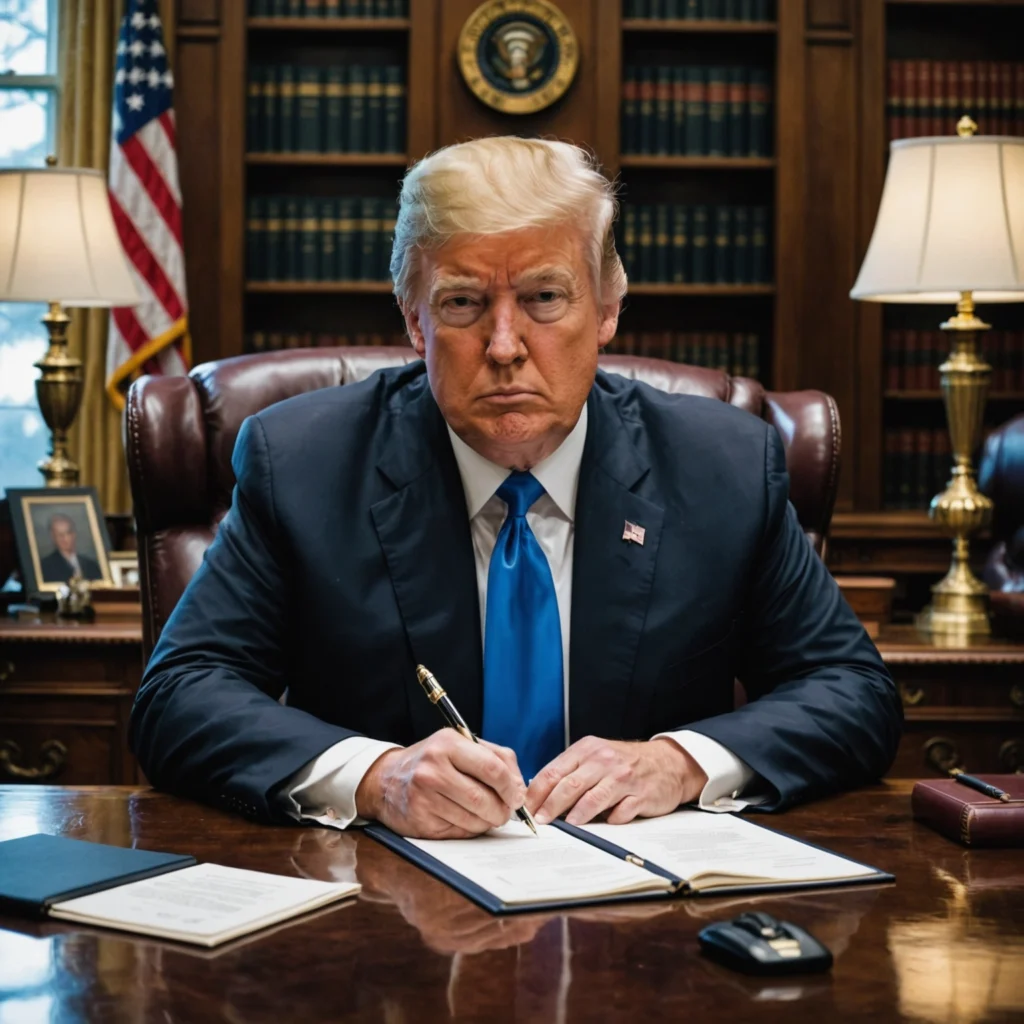
In an unexpected and dramatic twist, one of the nation’s top law firms struck an unprecedented deal with former President Donald Trump. This bold move not only exits a path fraught with legal perils but also ushers in a new era of strategic negotiations between the realms of law and politics.
Breaking the Silence: A Controversial Agreement
The law firm, renowned for its formidable legal expertise, agreed to engage in a $100 million pro bono legal commitment for the federal government. This decision came in the wake of intense public scrutiny and criticism, particularly directed by influential voices such as Elon Musk. As a result, critics allege that the firm caved to external pressure, a claim that reverberated across news outlets and social media platforms. Firstly, the firm announced, “We have decided to use our expertise in a way that serves the nation,” and subsequently, they detailed the agreement in a press conference peppered with optimism and urgency.
The Dynamics Behind the Deal
Many political analysts highlighted that the arrangement emerged amid a turbulent political landscape, where top law firms found themselves targeted by accusations from Trump supporters. In addition, political insiders explained that the firm sought to steer clear of potential legal entanglements that could arise from mounting political pressure. For example, the negotiations involved multiple steps, which included:
- Drafting an airtight legal agreement
- Consulting with internal experts to assess risk
- Engaging with federal officials to clarify expectations
Moreover, the firm published a detailed statement, emphasizing its commitment to uphold the highest standards of legal service and public duty. Consequently, legal observers argued that the move showcased a pragmatic approach in navigating the complex intersection of law and politics.
Political Repercussions and International Response
The firm’s decision quickly caught the attention of political figures both domestically and abroad. Notably, Canadian Prime Minister Mark Carney and other international leaders found themselves embroiled in heated discussions with Trump’s administration. Trump announced urgent plans to impose sweeping 25% tariffs on imported cars, a move which Canadian officials condemned as a direct attack on national industries. As events unfolded, Carney vowed, “We will defend our workers, we will defend our companies, and we will defend our country,” thereby asserting the nation’s sovereign rights. Furthermore, there emerged an international web of political alliances and economic strategies. In a timely press release, Canadian authorities laid out their concerns in a succinct table:
| Issue | Canada’s Position | US Administration’s Stance |
|---|---|---|
| Tariffs on Automobiles | Opposed, citing economic harm | Supportive, focused on protectionism |
| Trade Negotiations | Demanding fair negotiations | Urgent, with threats of further tariffs |
In addition, political commentators noted that these developments led to robust debates about economic fairness and national sovereignty. Simultaneously, business leaders and economists employed transitional arguments such as “firstly,” “moreover,” and “in addition” to underscore the multilayered repercussions of these policies.
A Closer Look at the Legal and Political Strategies
The law firm’s decision paralleled a broader trend in which legal professionals actively engage in political matters. In a surprising twist, the firm’s pro bono commitment contrasted sharply with its usual high-fee corporate work. Therefore, many industry experts argued that the move signified a deliberate pivot towards public service amid turbulent times. Additionally, several key points emerged:
- Legal experts cited the agreement as an innovative method to defuse political pressures.
- Political strategists received the announcement as a signal that negotiations involving major legal and political actors would intensify.
- Critics maintained that the agreement represented a compromise on ethical boundaries.
Subsequent interviews with senior partners revealed that the firm anticipated challenges yet remained optimistic. They claimed, “Our mission focuses on excellent legal service that contributes to the public good.” Thus, the narrative evolved with benefits reportedly extending to broader society, giving hope to reform-minded advocates.
A Deeper Dive into International Diplomatic Exchanges
Interestingly, the cross-border diplomatic dialogue grew intense when news outlets reported that Canadian Prime Minister Mark Carney prepared for his first conversation with President Trump. This historical call aimed to address the spiraling tariff dispute while emphasizing that negotiations would proceed on Canada’s sovereign terms. Additionally, analysts believed that Carney’s willingness to engage diplomatically signified a firm resolve in protecting national interests. Moreover, several factors complicated the discussions:
- Pressure from domestic industries
- Concerns about retaliatory economic measures
- Calls for fairness from allied international partners
Subsequently, a series of strategic dialogues took place within high-level diplomatic circles, notably at international economic summits. Various countries found themselves balancing between maintaining cordial ties with the United States and adhering to their own economic priorities. Overall, observers noted that meticulous negotiation techniques characterized each conversation, using transitional arguments such as “consequently” and “furthermore” to illustrate progress.
The Role of Media and Public Perception
Media outlets across the globe reported vigorously on the unfolding drama, stimulating public discourse. Journalists utilized a combination of analytical tables, bullet lists, and interviews to present the unfolding narrative with clarity. For instance, one prominent newspaper listed the sequence of events as follows:
- The law firm’s announcement and its $100 million pro bono deal
- Trump’s tariff declarations and threats of further economic measures
- International diplomatic engagements, particularly with Canada
Moreover, social media erupted with discussions, and bloggers offered live updates. Consequently, audiences across various platforms expressed strong opinions both supporting and criticizing the moves. Editors highlighted that a free press plays a crucial role in illuminating political strategies. At the same time, public reaction remained polarized, with many arguing that the firm demonstrated both entrepreneurial ingenuity and vulnerability under political pressure.
Future Implications and Strategic Forecasts
Undoubtedly, this landmark decision by the law firm set the stage for future battles in both legal and political domains. Experts predict that subsequent developments will force more law firms to reconsider traditional engagements with political adversaries. In addition, the interplay between economics and international diplomacy may lead to novel collaborative initiatives. Moreover, political strategists foresee that:
- New legal agreements might emerge as frameworks for political negotiations.
- International trade policies could undergo substantial revision.
- Diplomatic channels might intensify in order to manage escalating economic disputes.
In a detailed chart summarizing the potential implications, analysts compared various scenarios:
| Scenario | Expected Impact | Timeframe |
|---|---|---|
| Enhanced Legal-Political Collaboration | Increase in bipartisan legal reforms | Short term |
| International Trade Adjustments | Redefinition of trade agreements | Mid term |
| Diplomatic Engagement Intensification | Smoother resolutions of tariff disputes | Long term |
Subsequently, both legal experts and political risk analysts employed transitional words, like “thus,” “therefore,” and “subsequently,” to illustrate growth areas in political legal dynamics. They emphasized that future policies might pivot significantly under these new pressures.
Examining the Broader Narrative
The narrative simmering around this deal covers multiple layers of political and legal intrigue. First, the law firm’s decision to support a political figure through mandated public service exposed the intricate dynamics of power, responsibility, and public accountability. Moreover, industry pundits explained that this episode might herald a shift in how legal institutions view their roles in society. Equally, policymakers argued that the firm’s commitment might drive competitive reform across other firms. Additionally, academic experts stressed that this unfolding narrative provided a rare window into modern governance challenges. In summary, this historical agreement not only underscores the power of negotiation but also reminds us of the complex, interwoven nature of our political ecosystems. By skillfully interlacing economic, legal, and diplomatic narratives, this episode stands as a testament to American resilience in times of overriding political tension.




